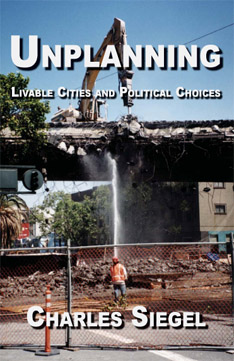Unplanning sounds like a book for the Antiplanner. But the title is deceptive. Author Charles Siegel is critical of the urban planners who, according to the myth, planned and designed the low-density suburbs that most Americans live in today. He supports the high-density, anti-automobile goals of most of today’s urban planners. He just wants to achieve those goals with top-down political action, not top-down planning.
Instead of building new roads, says Siegel, we should build more rail transit. Instead of building low-density suburbs, we should cluster development around rail stations. Instead of speed limits of 45 to 65 mph on urban arterials, he says we should limit speeds to 30 mph.
Like most New Urbanists, Siegel lives in a fantasy world in which people will behave the way he thinks they ought to behave instead of the way they do behave. Siegel presents a circa 1910 postcard of a streetcar suburb, saying “streetcar suburbs were greener, less congested, quieter, and safer for children than today’s automobile-oriented suburbs.”












